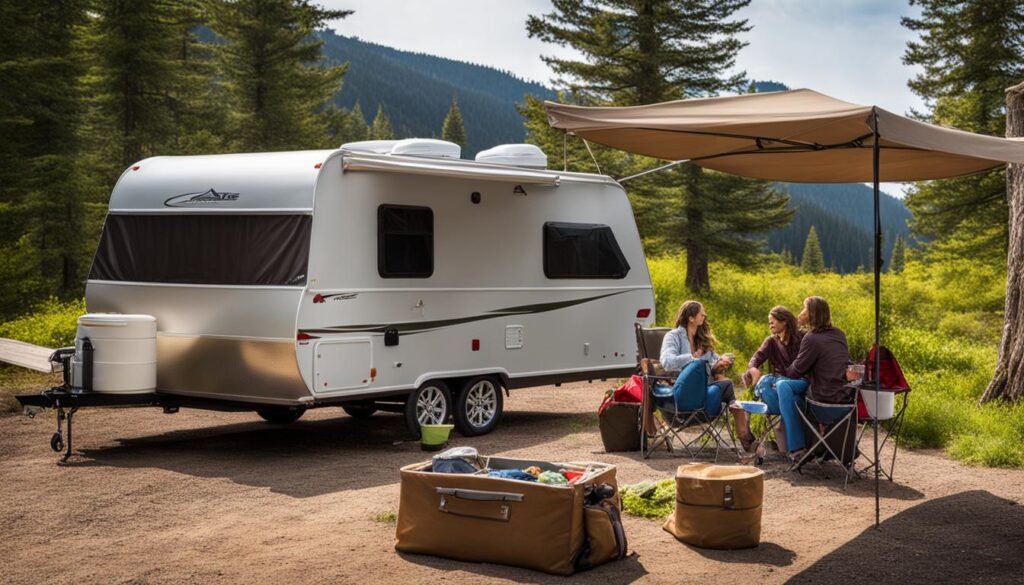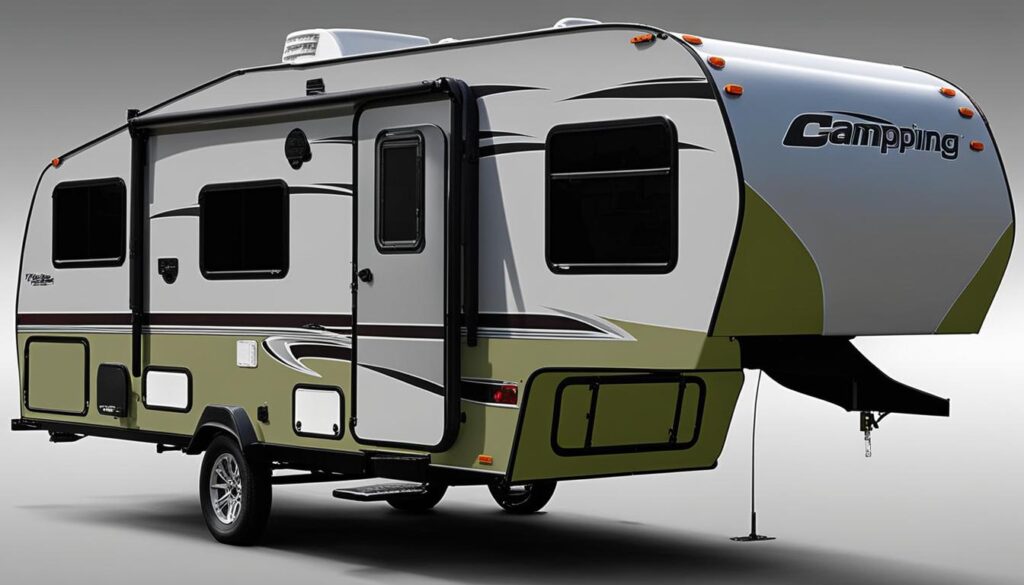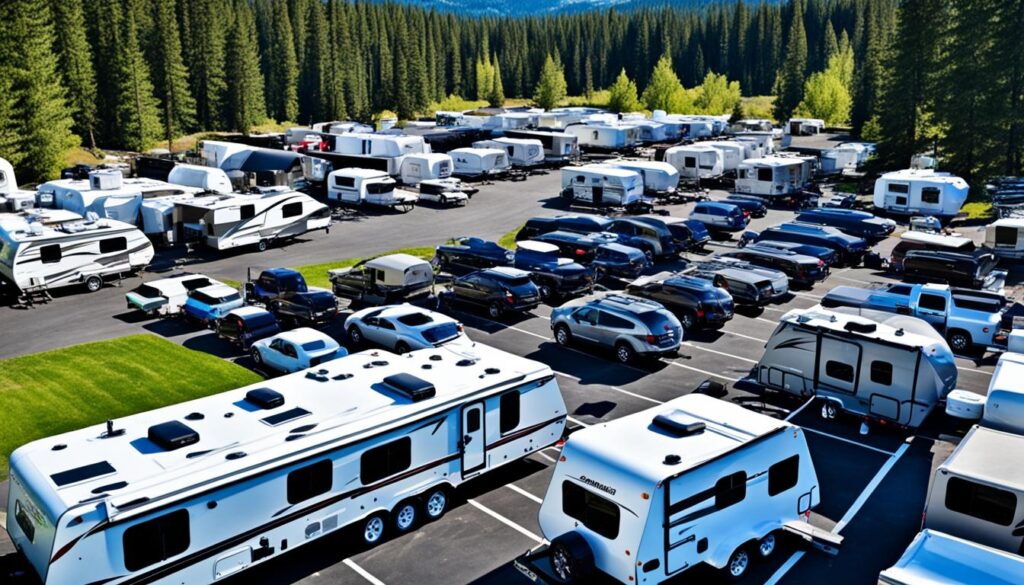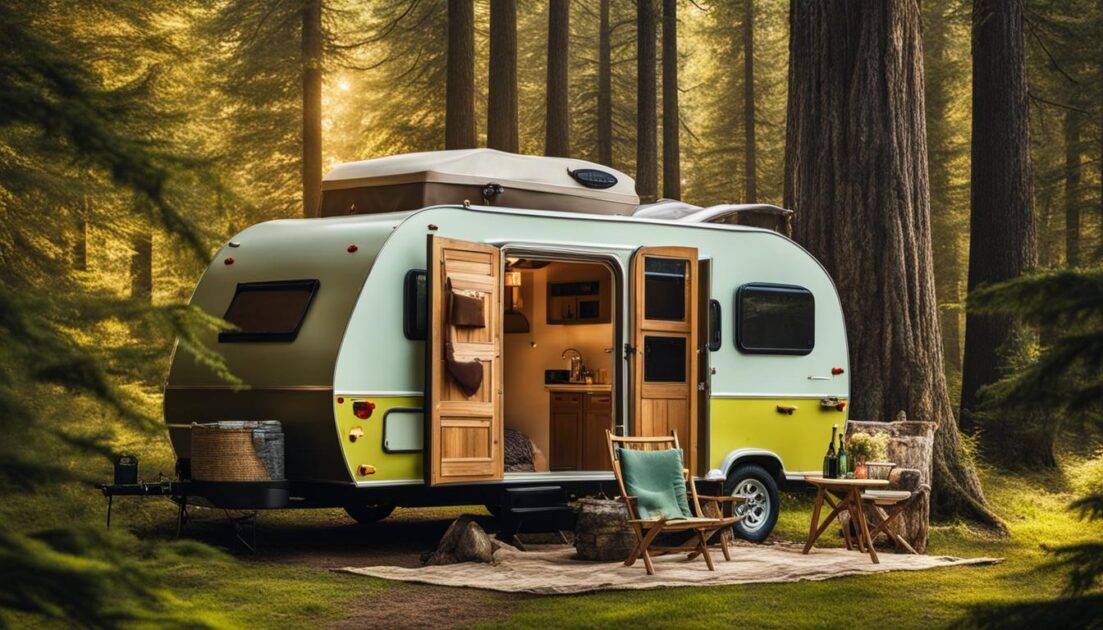Are you ready to take your outdoor adventures to the next level? If so, a camping trailer might be the perfect companion for your travels. But what exactly is a camping trailer, and what makes it such a popular choice among campers?
A camping trailer, sometimes referred to as a towable recreational vehicle (RV), is a mobile living space that provides the comforts of home while you explore the great outdoors. It is typically hauled behind a truck, SUV, or other half-ton towable vehicle, offering flexibility and affordability for campers of all levels of experience.
Camping trailers come in various types and sizes, each with its own unique features and amenities. Whether you prefer a lightweight and compact pop-up trailer or a spacious fifth-wheel trailer, there’s a camping trailer out there to suit your needs and preferences.
Key Takeaways:
- A camping trailer is a towable recreational vehicle (RV) that provides a mobile living space for outdoor adventures.
- It is typically hauled behind a truck, SUV, or other half-ton towable vehicle.
- Camping trailers offer a range of features and amenities to suit different needs and preferences.
- They are a popular choice among campers for their flexibility and affordable price range.
- There are different types of camping trailers, including pop-up trailers, travel trailers, fifth-wheel trailers, and toy haulers.
Benefits of Camping Trailers
Camping trailers offer several benefits compared to other types of RVs. First, they provide the option to unhitch the trailer and use the tow vehicle to explore the surrounding areas, without the need to pack and disconnect everything inside the camper. This flexibility allows campers to easily navigate city roads, park, and access drive-thrus.
Second, camping trailers are generally more affordable than motorhomes and offer a wider range of options to fit different budgets. Additionally, trailers can be towed by a variety of vehicles, making them accessible to a larger group of people.
Lastly, trailers can be used year-round, as the tow vehicle can be used independently, unlike all-in-one RVs.

Types of Camping Trailers
When it comes to camping trailers, there are several types to choose from, each offering its own unique features and benefits. Whether you prefer a lightweight and compact option or a spacious trailer with all the amenities, there’s a camping trailer out there to suit your needs. Here are a few popular types of camping trailers:
1. Pop-up Trailers
Pop-up trailers, also known as folding trailers, are a budget-friendly option for camping enthusiasts. These trailers have tent-like sides that can be expanded, providing extra living space. They are lightweight and compact, making them easy to tow and maneuver. While pop-up trailers may not offer the same level of luxury as larger trailers, they are perfect for those who prefer a simpler camping experience.
2. Travel Trailers
Travel trailers are the most common type of camping trailers and come in a variety of sizes and designs. From small teardrop trailers to mid-sized trailers with slide-outs for additional living space, there’s a travel trailer for every camping style. These trailers are typically towed by a truck or SUV and offer a range of amenities such as kitchens, bathrooms, and sleeping areas. Travel trailers provide a comfortable and convenient camping experience for both short and long trips.
3. Fifth-Wheel Trailers
Fifth-wheel trailers are designed to be towed by pickup trucks equipped with a fifth-wheel hitch. These trailers have a unique design that extends over the bed of the truck, providing additional living space. The front of the trailer features a dedicated bedroom area, separate from the rest of the living quarters. Fifth-wheel trailers offer more room and amenities compared to other types of camping trailers and are well-suited for those who desire a spacious and luxurious camping experience.
4. Toy Haulers
Toy haulers, also known as sport-utility trailers, are perfect for camping enthusiasts who want to bring along their outdoor toys, such as motorcycles or ATVs. These trailers have an enclosed garage area at the back, allowing for easy transportation of recreational vehicles and gear. The front of the trailer typically features a living space with all the necessary amenities. Toy haulers provide the best of both worlds, combining comfortable living quarters with the ability to transport and store outdoor equipment.

From lightweight and affordable options to luxurious and spacious trailers, there is a camping trailer to accommodate every camping style. Consider your needs and preferences when choosing the perfect camping trailer for your outdoor adventures.
Considerations for Choosing a Camping Trailer
When it comes to choosing the ideal camping trailer, there are several important factors to consider. Making the right choice will ensure that your outdoor adventures are comfortable, convenient, and enjoyable. To make an informed decision, take into account the following key considerations:
- Weight and Towing Capacity: One of the most critical factors to consider is the weight of the camping trailer and its compatibility with your vehicle’s towing capacity. It is essential to ensure that your chosen trailer can be safely towed by your vehicle without exceeding its limits. Check the manufacturer’s specifications and consult with experts if you are unsure.
- Floorplan and Layout: Another crucial consideration is the floorplan and layout of the trailer. Think about your specific needs and preferences in terms of sleeping arrangements, living space, kitchen facilities, storage areas, and bathroom amenities. Assessing the floorplan will help you determine if the trailer provides the necessary features and functionality for your camping trips.
- Interior and Exterior Design: The design of the camping trailer should align with your personal taste and style. Consider both the interior and exterior aesthetics, as they contribute to the overall camping experience. Whether you prefer a sleek and modern design or a rustic and cozy atmosphere, choose a trailer that reflects your desired ambiance.
- Research and Information: Conduct thorough research on different camping trailer models, brands, and dealers. Read reviews, compare features, and gather as much information as possible. Consulting with reputable dealers or manufacturers will provide valuable insights and help you make an informed decision.
By carefully considering these factors, you can choose a camping trailer that meets your specific needs and preferences, ensuring a memorable and comfortable outdoor experience.
Camping Trailer Comparison
| Trailer Model | Weight (lbs) | Floorplan | Interior Design |
|---|---|---|---|
| Cruiser RV Shadow Cruiser | 5,500 | Front bedroom, rear bath | Modern and sleek |
| Forest River Rockwood Roo | 4,000 | Expandable hybrid design | Comfortable and cozy |
| Airstream Basecamp | 3,500 | Compact and versatile | Stylish and contemporary |
| Jayco North Point | 12,000 | Luxurious and spacious | Elegant and high-end |
Quote:
“Finding the perfect camping trailer involves careful consideration of weight, floorplan, design, and in-depth research. By taking these factors into account, campers can select a trailer that suits their unique needs and enhances their outdoor experience.” – RV Expert
Choosing a camping trailer is an exciting journey that requires attention to detail and consideration of individual preferences. By evaluating weight compatibility, floorplan suitability, design aesthetics, and gathering comprehensive information, you can confidently select a camping trailer that meets your needs, ensuring memorable adventures in the great outdoors.

Towing and Setup of Camping Trailers
When it comes to camping trailer adventures, proper towing and setup are essential for a smooth and enjoyable experience. These tasks require specific skills and knowledge to ensure safety and convenience throughout your journey. Let’s delve into the important aspects of towing and setting up a camping trailer.
Towing a Camping Trailer
Towing a camping trailer requires careful consideration of towability. It is crucial to learn how to safely hitch and unhitch the trailer, practice reversing and maneuvering, and understand weight distribution and sway control measures to ensure stable towing.
Here are a few key points to keep in mind:
- Properly hitch and unhitch the trailer from your tow vehicle following manufacturer guidelines.
- Practice backing up and maneuvering the trailer in a safe and open space to gain confidence in handling.
- Ensure proper weight distribution of cargo within the trailer to maintain a balanced towing experience.
- Consider installing sway control devices to minimize any side-to-side movement while towing.
Setting Up a Camping Trailer
Once you arrive at your campsite, setting up the trailer is the next step to create your home away from home. The setup process involves a few key tasks:
- Leveling the Trailer: Use leveling blocks or jacks to ensure the trailer is positioned evenly on the ground. This is important for stability and proper functioning of appliances and utilities.
- Connecting Utilities: Hook up the trailer to the campground’s water and electrical supply if available. Properly connect hoses and cables, ensuring a secure and functional connection.
- Extending Slide-Outs (if applicable): If your camping trailer has slide-outs, extend them to create additional living space. Follow manufacturer instructions to avoid any potential damage.
It’s important to note that different campgrounds may have specific regulations regarding trailer setup and usage. Always adhere to any rules or guidelines provided by the campground to ensure a smooth and respectful camping experience for everyone.
To give you an idea of how to safely tow and set up a camping trailer, here’s a helpful diagram:
With these tips in mind, you’ll be well-equipped to tow and set up your camping trailer for an unforgettable outdoor adventure.
Maintenance of Camping Trailers
Regular maintenance is essential to keep a camping trailer in good condition. By properly caring for your trailer, you can ensure its longevity and reliability on your outdoor adventures. Let’s explore some key aspects of camping trailer maintenance:
Tires, Brakes, and Hitch Components
Your camping trailer’s tires, brakes, and hitch components play crucial roles in its safety and performance. Regularly inspect the tires for signs of wear or damage, and maintain the recommended tire pressure. Ensure that the brakes are functioning properly and have them checked by a professional if necessary. Additionally, inspect the hitch components for any signs of wear or corrosion, and lubricate them as recommended by the manufacturer.
Exterior Cleaning and Inspections
Keeping the exterior of your camping trailer clean not only improves its appearance but also helps prevent damage. Regularly wash the trailer with a mild detergent, and pay close attention to the roof, windows, and seams. Inspect the exterior for any cracks, leaks, or loose seals, and address any issues promptly to prevent further damage.
Interior Cleaning and System Checks
The interior of your camping trailer requires regular cleaning and maintenance. Vacuum and wipe down the surfaces regularly to remove dirt and debris. Check the appliances, plumbing, electrical systems, and other components for proper functioning. If you notice any issues, consult the owner’s manual or seek professional assistance to ensure proper repairs or adjustments.
Winterization
If you live in an area with cold winters or plan to store your camping trailer during the off-season, it’s important to winterize it properly. Empty and flush the water system to prevent freezing and potential damage. Remove any perishable items and clean the interior thoroughly. Protect the trailer from pests by sealing openings and ensuring proper ventilation. Consult the manufacturer’s guidelines for specific winterization procedures for your trailer.
By following these maintenance practices and seeking professional assistance when needed, you can keep your camping trailer in optimal condition and enjoy seamless outdoor adventures for years to come.
| Important Tips for Camping Trailer Maintenance |
|---|
| Regularly inspect tires, brakes, and hitch components |
| Clean and inspect the exterior for damage or leaks |
| Keep the interior clean and check appliances and systems |
| Properly winterize the trailer for cold months or storage |
Choosing the Perfect Camping Trailer Size
When it comes to choosing a camping trailer, finding the perfect size is essential. The right size depends on your personal preferences and the towing capacity of your vehicle. Camping trailers come in a range of sizes, typically ranging from 8 to 40 feet in length and weighing anywhere from 1,000 to 10,000 pounds.
If you have a midsized SUV, a smaller and more lightweight trailer may be the ideal choice. These trailers can be easily towed by your vehicle without sacrificing comfort and functionality. On the other hand, if you have a more powerful tow vehicle like a pickup truck, you have the option of larger trailers that offer more space and amenities.
It’s important to consider not only the length, but also the weight of the camping trailer. Remember to account for the weight of cargo and passengers to ensure it doesn’t exceed the towing capacity of your vehicle. Additionally, consider the size restrictions of your desired campsite, as some smaller campsites have limitations on trailer length.
Ultimately, choosing the perfect camping trailer size requires careful consideration of your needs, the capabilities of your tow vehicle, and the limitations of your desired camping destinations. By finding the right balance between size and towing capacity, you can enjoy comfortable and hassle-free camping adventures.
FAQ
What is a camping trailer?
A camping trailer is a towable recreational vehicle (RV) that is typically hauled behind a truck, SUV, or other half-ton towable vehicle. It provides a mobile living space for outdoor adventures and is a popular choice among campers for its flexibility and affordable price range.
What are the benefits of camping trailers?
Camping trailers offer several benefits compared to other types of RVs. They provide the option to unhitch the trailer and use the tow vehicle to explore the surrounding areas, without the need to pack and disconnect everything inside the camper. This flexibility allows campers to easily navigate city roads, park, and access drive-thrus. Additionally, camping trailers are generally more affordable than motorhomes and offer a wider range of options to fit different budgets. They can be towed by a variety of vehicles, making them accessible to a larger group of people. Lastly, trailers can be used year-round, as the tow vehicle can be used independently, unlike all-in-one RVs.
What are the types of camping trailers?
There are several types of camping trailers to consider. Pop-up trailers, also known as folding trailers, have tent-like sides and are lightweight and compact. Travel trailers are the most widely sold and come in various sizes and designs. Fifth-wheel trailers are designed to be towed by pickup trucks and offer more living space with a dedicated bedroom in the front. Toy haulers, also known as sport-utility trailers, have an enclosed garage in the back for carrying motorcycles or other outdoor gear.
What should I consider when choosing a camping trailer?
When choosing a camping trailer, several factors should be considered. First, the weight of the trailer is crucial to ensure it can be safely towed by the chosen vehicle. The floorplan and features of the trailer should also be considered, as they determine the layout and amenities inside. The design of the trailer, both interior and exterior, should match personal preferences. Additionally, it is recommended to ask for more information from dealers or manufacturers to get a comprehensive understanding of the available options.
How do I tow and set up a camping trailer?
Towing and setting up a camping trailer require specific skills and knowledge. It is important to learn how to safely hitch and unhitch the trailer and practice reversing and maneuvering the trailer. Proper weight distribution and sway control measures should be taken to ensure stable towing. Setting up the trailer at a campsite involves leveling the trailer, connecting utilities such as water and electricity, and extending slide-outs if applicable. Campers should also be aware of any specific campground regulations regarding trailer setup and usage.
How do I maintain a camping trailer?
Regular maintenance is essential to keep a camping trailer in good condition. This includes checking and maintaining the trailer’s tires, brakes, and hitch components. The trailer’s exterior should be cleaned and inspected for any damage or leaks. The interior of the trailer should be cleaned regularly, and appliances and systems should be checked for proper functioning. It is also important to winterize the trailer if it will not be used during cold months to prevent damage from freezing temperatures. Following the manufacturer’s maintenance recommendations and seeking professional assistance when needed can help prolong the lifespan of the camping trailer.
How do I choose the perfect camping trailer size?
Choosing the right size of camping trailer depends on personal preferences and the towing capacity of the vehicle. Camping trailers come in a range of lengths and weights. Smaller trailers are more lightweight and can be towed by midsized SUVs, while larger trailers require a more powerful tow vehicle, such as a pickup truck. It is important to consider the overall weight of the trailer, including cargo and passengers, to ensure it does not exceed the vehicle’s towing capacity. Additionally, the size of the camping trailer should be suitable for the desired campsite, as some smaller campsites may have limitations on trailer length.

